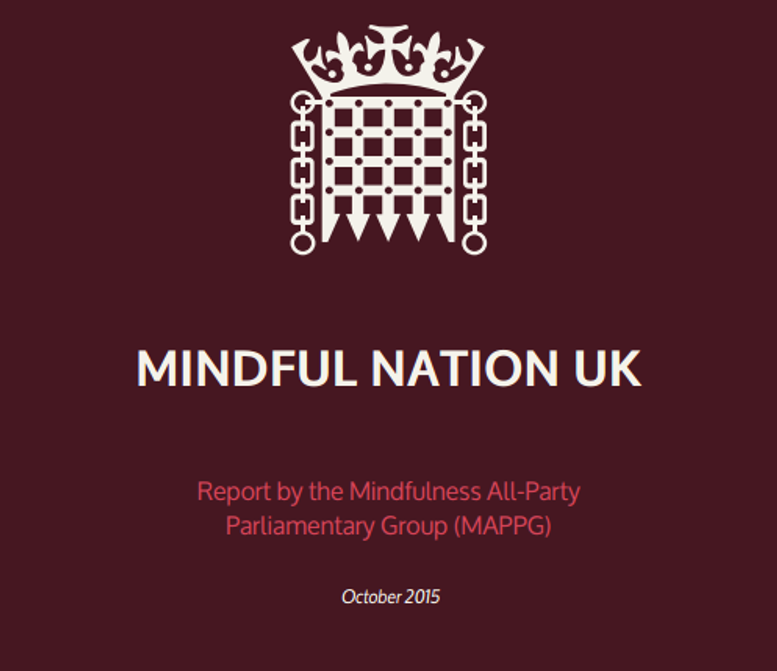Mindful Nation UK Report
“Today is a turning point for the global view of the value of Mindfulness in our modern lives.”
After a year of intensive research by a committed group of mindfulness practitioners, teachers, leaders and policy makers, the final report from the Mindfulness All-Party Parliamentary Group (MAPPG) and the Mindfulness Initiative released the “Mindful Nation UK” report at British Parliament.
We asked mindfulness pioneers, Joel and Michelle Levey, who have run several Mind Fitness workshops with Future Considerations and written two books on mindfulness, for their view on this report…
“This is the first time that top-level governmental leaders have collectively endorsed such an initiative and set of recommendations for a whole nation. Today is a turning point for the global view of the value of Mindfulness in our modern lives. We are honoured to have served as advisors for this historic and timely report.
We were invited to offer a special briefing for the Mindfulness All-Party UK Parliamentary Group (MAPPG) in the summer of last year. We discussed our pioneering work; we were among the very first people to introduce mindfulness practices into mainstream business, medical, and higher education settings beginning in the mid-70s. We also discussed, in particular, how to determine quality standards for qualified mindfulness instructors – a topic which is becoming a very important consideration as more and more people become involved with teaching mindfulness.
We believe that as mindfulness matures and progresses, the wisdom it reveals liberates us from the illusions of a separate, solid, definable self, and teaches us to stand strong, live in the power of an open question, and be more comfortable with the uncertainty and ambiguity of our lives.
Mindfulness gives us the strength and presence of mind to be more resilient and adaptable in the midst of incessant, unpredictable change. It also gives us the power of presence to touch stillness in the midst of activity, find clarity in the midst of confusion, be peaceful within turbulence, and open our hearts to compassion in the presence of suffering.”
The following is an excerpt from the Executive summary – Mindful Nation UK:
“In recent years, there has been an explosion of interest in mindfulness with widespread media coverage, bestselling books and a remarkable uptake of online resources. Mindfulness means paying attention to what is happening in the present moment in the mind, body and external environment, with an attitude of curiosity and kindness. There has been a huge increase in academic research on the subject with more than 500 peer-reviewed scientific journal papers now being published every year. Meanwhile developments in neuroscience and psychology are illuminating the mechanisms of mindfulness. The Mindfulness All-Party Parliamentary Group (MAPPG) was impressed by the levels of both popular and scientific interest, and launched an inquiry to consider the potential relevance of mindfulness to a range of urgent policy challenges facing government. Many members of the MAPPG have been further impressed by the potential of mindfulness after personally experiencing the benefits on courses held in Westminster ….”
Key Recommendations – Mindful Nation UK – regarding Mindfulness in the Workplace:
We recommend that:
- The Department for Business, Innovation and Skills (BIS) should demonstrate leadership in working with employers to promote the use of mindfulness and develop an understanding of good practice.
- We welcome the government’s What Works Centre for Wellbeing, and urge it to commission, as a priority, pilot research studies on the role of mindfulness in the workplace, and to work with employers and university research centers to collaborate on high-quality studies to close the research gap.
- Government departments should encourage the development of mindfulness programmes for staff in the public sector – in particular in health, education and criminal justice – to combat stress and improve organizational effectiveness. One initiative could be seed-funding for a pilot project in policing where we have encountered considerable interest.
- The National Institute of Health Research should invite bids to research the use of mindfulness as an occupational health intervention and its effectiveness in addressing occupational mental health issues such as stress, work-related rumination, fatigue and disrupted sleep.
The full report can be downloaded here. If you would like to know more about incorporating mindfulness practice within your organisation, please get in touch with us.
For more information on the work Joel and Michelle Levey do, please visit wisdomatwork.com





Leave a Reply